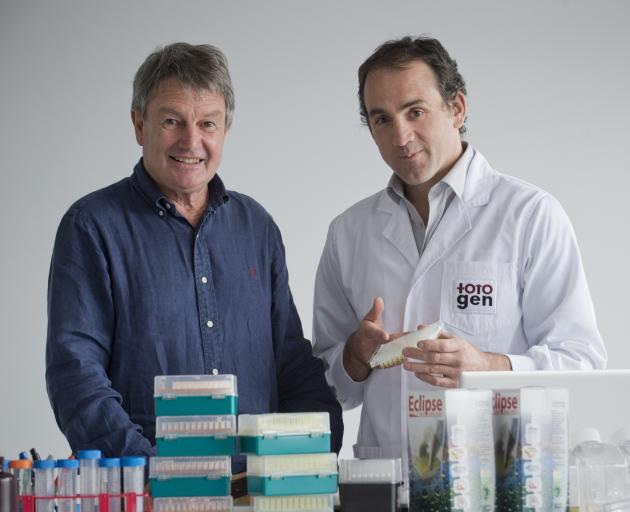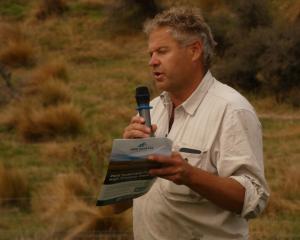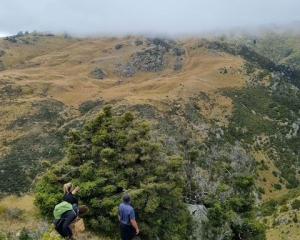
Now Tim Hore and Andy Ramsden have teamed up to provide low-cost analysis of sheep DNA as part of a mission to transform the farming industry, particularly sheep. And it is all being done in a laboratory in downtown Dunedin.
Mr Ramsden said he believed it was the "breakthrough" needed to help rebuild profitability of sheep farming through information. "Without it, we’re a little bit stuck where we’ve been," he said.
TotoGen was founded by Dr Hore, a molecular biologist, and Mr Ramsden, a fourth-
generation farmer, in 2021. They wanted commercial farmers to be able to afford to use DNA analysis on all their animals as just another farm input.
The team now works with commercial farmers and farming groups, providing DNA analysis on a larger scale or for a specific aspect of a breeding programme, and with a range of partners on bespoke research and development (R&D) projects.
For Dr Hore, there was very much a personal reason for his interest. He grew up on a large sheep and beef farm Blackstone Hill, near Becks, in Central Otago, which was now farmed by his brother Ben and sister-in-law Vanessa.
"It’s a passion, of course it’s a passion. Farming is a part of my identity. We’ve just gone 100 years at Blackstone Hill, we’ve been in the Maniototo since the gold-mining days. It’s exciting to bring that passion through into the professional space."
Dr Hore has been a molecular biologist for 20 years but mostly in an academic sense, working with "townies" and academics around the world. His PhD, in epigenetics, was completed in 2008 at the Australian National University in Canberra. He moved to Cambridge, England, for post-doctoral research, and later returned to Dunedin.
Mr Ramsden, who lives in Wanaka and is responsible for TotoGen’s’s customer relationships and business development, has been involved in genetics for 40 years, 30-plus years in his own right.
He established Headwaters in 2006 to breed ewes with high levels of good polyunsaturated fat for the high country and it now had about 250,000 breeding ewes and 50 farmer shareholders.
He then created and trademarked a new breed of sheep called Astino whose wool has featured in face masks. TotoGen’s was now helping Astino with some R&D initiatives.
He recalled not wanting to be in the paddock catching lambs to assign parentage — the traditional way — which was too disruptive. He needed to find another way to do that and, at AgResearch, a DNA product was developed and offered to the wider sheep community. That capability was later sold to Pfizer.
Since then, Mr Ramsden had wanted to see affordable analysis available to commercial farmers, saying the best commercial ewes on properties were not identifiable. The only way to do that was to assign parentage to all lambs but it had to be cost-effective.
He was introduced to Dr Hore through George Collier from ICL Chartered Accountants — "turns out we were looking for each other" — and TotoGen was subsequently formed.
Dr Hore and his wife Dr Donna Bond, also a molecular biologist, developed a genetic technology methodology that "dramatically" reduced cost. In summer 2022, TotoGen processed the first samples from Blackstone Hill.
It was now in the public arena, offering services to the sheep industry. The same technology could also be used for other species.
"If it involves DNA, we can do it. We can sequence lots of different things," Dr Hore said.
But its core business was livestock, particularly sheep which was where they saw the greatest opportunity in terms of the most gains that could be made.
With all the regulation and restrictions the farming sector faced, farmers needed to be much more accountable for everything they were doing. That meant less hooves on the land and having the most efficient animals, Mr Ramsden said.
Bringing replacements into the breeding programme from known livestock would be how farmers were able to cope "with what’s coming at us".
"We’ve got to get sheep farming to be more profitable again to be competitive so food producing land doesn’t go into exotic species. The onus is on the industry to rethink its whole business model," he said.
Other protein producers, like dairy, pork and chicken, knew a lot more about their animals, their makeup and production history.
"We don’t have that in sheep because the value of the animal and cost of finding out more data has not been worth it," he said.
The key was to get costs down and get values up. Wool and meat needed to be taken out of the commodity bracket; other models of land use that were already doing that, like gold kiwifruit needed to be looked at.
The sheep industry needed to link "the beginning to the end" much better and until it did that, it would be struggling to be competitive for land use, he said.
TotoGen is being chaired by Matt Gorman who runs his business Lookout Point Consulting & Coaching from Clyde. He has governance roles across a range of sectors and brought some 30 years of experience in senior management roles in professional services around the world.
He said that he knew nothing about sheep but TotoGen needed complementary skills for business and governance. Being based in Central Otago and through his other clients, he was also developing a network of contacts in agribusiness.
Mr Gorman was excited about working with a business with a sense of purpose and the potential to "really change the industry".
Mr Ramsden said TotoGen had a low overhead approach and the ability to be nimble. It was supported by a lab manager while Dr Hore also praised his wife for the "huge amount" she had contributed. Through her maternity leave, she got a lot of new technology going, he said.
Mr Ramsden said Dunedin was also an ideal place to be based. The city had become quite a hub for technology, including agri-tech.















